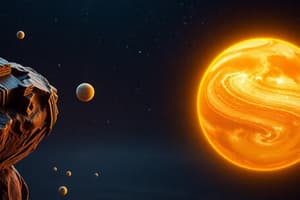Podcast
Questions and Answers
Force is considered a scalar quantity because only magnitude is important.
Force is considered a scalar quantity because only magnitude is important.
False (B)
The SI unit of force is the joule (J).
The SI unit of force is the joule (J).
False (B)
Torque is the rotational equivalent of force.
Torque is the rotational equivalent of force.
True (A)
Frictional and gravitational forces are examples of internal forces.
Frictional and gravitational forces are examples of internal forces.
In equilibrium, the internal mechanical stress causes no acceleration of the body.
In equilibrium, the internal mechanical stress causes no acceleration of the body.
What distinguishes a vector quantity like force from a scalar quantity?
What distinguishes a vector quantity like force from a scalar quantity?
What role does force play in Newton's laws of motion?
What role does force play in Newton's laws of motion?
Explain the impact of unbalanced forces on an object.
Explain the impact of unbalanced forces on an object.
How does torque relate to the concept of force?
How does torque relate to the concept of force?
What happens to the mechanical stresses in a body when it is in equilibrium?
What happens to the mechanical stresses in a body when it is in equilibrium?
Flashcards
Force
Force
An influence that changes an object's velocity unless counteracted by other forces.
Vector Quantity
Vector Quantity
A quantity with both magnitude and direction.
Newton (N)
Newton (N)
SI unit of force.
Classical Mechanics
Classical Mechanics
Signup and view all the flashcards
Torque
Torque
Signup and view all the flashcards
What makes force a vector quantity?
What makes force a vector quantity?
Signup and view all the flashcards
Types of forces
Types of forces
Signup and view all the flashcards
Internal Stress
Internal Stress
Signup and view all the flashcards
Modern Physics
Modern Physics
Signup and view all the flashcards
Study Notes
Force
- A force influences an object's velocity change if not countered by other forces.
- Force is a vector quantity, meaning both magnitude and direction matter.
- The SI unit of force is the newton (N).
- Force is represented by the symbol F.
Force in Classical Mechanics
- Force concepts are central to Newton's laws of motion.
- Common forces include elastic, frictional, contact/normal, and gravitational forces.
- Torque is the rotational equivalent of force, causing changes in rotational speed.
- Internal mechanical stress describes force distribution within an extended body.
- In equilibrium, internal forces balance, preventing acceleration.
- Imbalance in internal forces can deform solids or cause fluid flow.
Force in Modern Physics
- Modern physics (including relativity and quantum mechanics) connects forces to fundamental interactions.
- Classical mechanics' force concept remains useful for practical applications.
Studying That Suits You
Use AI to generate personalized quizzes and flashcards to suit your learning preferences.




